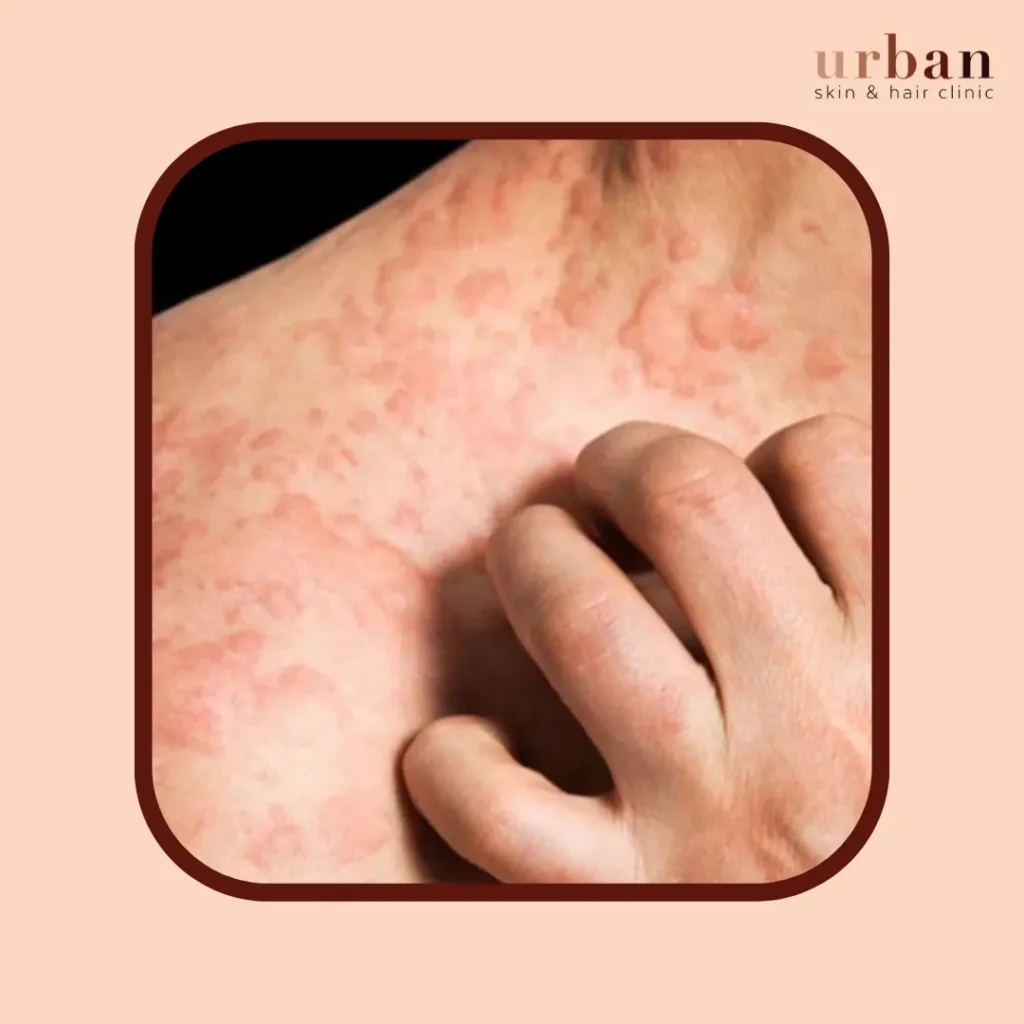
What is Pruritus?
Pruritus, or itching, is a common and distressing skin symptom that compels scratching. It can vary in intensity and duration, impacting daily life. Pruritus may be acute or chronic, localized or generalized, and is often accompanied by skin changes like redness or rash.
At Urban Skin & Hair Clinic, we’re dedicated to understanding and alleviating the causes of itching to restore comfort and well-being.
What are the Types of Pruritus?
Pruritus, or itching, comes in various forms, each categorized by its underlying cause and location on the body. At Urban Skin & Hair Clinic, we believe that understanding these different types is crucial in addressing the root of your itchiness and providing targeted relief. Let’s explore some of the most common types of pruritus:
- Brachioradial Pruritus: Itching of the upper arm caused by nerve damage. This type of pruritus can be perplexing, but our experts are here to decode its origins and offer suitable solutions.
- Nocturnal Pruritus: Itching that occurs at night, often attributed to reactions from your body’s natural functions, medications, or contact with skin irritants. We’ll delve into the factors triggering this nighttime itchiness and provide guidance for peaceful slumbers.
- Pruritus Ani: Itching around the anus caused by hemorrhoids, infections, or skin irritants. Our compassionate approach aims to ease discomfort and resolve the root issues.
- Senile Pruritus: Itching caused by skin changes affecting those over the age of 65. Our tailored care is designed to address age-related skin concerns and restore comfort.
- Uremic Pruritus: Itching among individuals with renal disease receiving dialysis. We understand the complexities of this condition and strive to alleviate discomfort through specialized care.
At Urban Skin & Hair Clinic, we stand committed to diagnosing the type of pruritus you’re experiencing and customizing treatments to address the underlying causes effectively. Join us on this enlightening journey, and let’s bid farewell to itchiness, embracing healthier and happier skin. Your relief awaits!

Signs & Symptoms of Pruritus
The primary symptom of pruritus, or itching, is that undeniable urge to scratch your skin in search of relief. However, scratching might not always provide the comfort you seek. Along with the itchiness, you may experience a range of additional symptoms, each offering valuable insights into the underlying cause of your discomfort.
Some common symptoms associated with scratching itchy skin include:
- Dry or Cracked Skin: Itchy skin may become dry or cracked due to frequent scratching.
- Scratch Marks (Excoriations): The repeated act of scratching can leave visible scratch marks on your skin.
- Thick, Leathery Patch of Skin (Lichenification): Chronic itching can lead to the formation of thick, leathery patches on your skin.
- Localized Pain: The site of your itchy skin may become tender or painful.
- Open Skin Breaks: Severe scratching can cause the skin to break open, leading to bleeding.
- Infection: Broken skin may develop an infection, characterized by fluid leakage, lack of healing, and a scaly or crusty texture.
At Urban Skin & Hair Clinic, our expert dermatologists are skilled in decoding the language of your skin, providing precise diagnoses, and tailoring effective treatment options. Let’s unlock the secrets of your itchy skin and pave the way to soothing relief and healthier, happier skin.

What are the causes Of Pruritus?
Pruritus, or itching, may arise from a multitude of underlying factors, each demanding attention to identify the root cause. At Urban Skin & Hair Clinic, we understand that understanding these triggers is paramount in devising targeted treatment plans for soothing relief. Let’s explore the common causes of pruritus:
- Skin Conditions: Various skin disorders, such as eczema, psoriasis, and dermatitis, can lead to persistent itching.
- Allergic Reactions: Your skin may react to allergens like pollen, pet dander, or certain fabrics, inducing itching.
- Dry Skin: Inadequate skin hydration can cause dryness and itchiness, especially in colder climates.
- Insect Bites: Mosquitoes, fleas, or bed bugs can leave itchy welts on your skin.
- Contact Dermatitis: Direct contact with irritants like soaps, detergents, or certain chemicals can trigger itching.
- Medications: Some medications can cause itching as a side effect.
- Systemic Diseases: Underlying medical conditions like liver or kidney diseases, thyroid disorders, or diabetes can manifest as itching.
- Nerve-Related Causes: Conditions like brachioradial pruritus can arise due to nerve damage.
- Psychological Factors: Stress, anxiety, or depression may lead to psychogenic itching.
- Age-Related Changes: Senile pruritus may occur due to skin alterations in older individuals.
- Uremic Pruritus: Individuals with renal disease receiving dialysis may experience itching as a symptom.
Treatment For Pruritus
At Urban Skin & Hair Clinic, we believe that the road to relieving pruritus begins with understanding its underlying cause. Our dedicated team of dermatologists is committed to identifying the triggers behind your itching and providing personalized treatment plans for effective relief. Let’s explore the comprehensive approach to treating pruritus:
Our priority is to diagnose and manage any skin conditions or medical issues contributing to your itching. Treating conditions like eczema, psoriasis, or allergies can alleviate itching significantly.
We offer a range of topical creams and ointments tailored to soothe and moisturize dry, irritated skin. These treatments can help reduce inflammation and itching.
For cases where allergies contribute to itching, antihistamines may be prescribed to block the release of histamine, reducing the urge to scratch.
Regular use of emollients and moisturizers can help keep your skin hydrated, preventing dryness and itching.
In severe cases, short-term use of corticosteroids may be recommended to reduce inflammation and itching.
Identifying and avoiding potential irritants, such as certain soaps or fabrics, can prevent further itching.
We’ll guide you on making lifestyle changes that can promote skin health and reduce itching triggers.
In cases of psychogenic itching, we offer compassionate support and may refer you to mental health professionals for additional care.
For specific pruritus conditions like brachioradial pruritus or uremic pruritus, specialized prescription medications may be prescribed.
We’ll work with you to develop a personalized skin care regimen to promote overall skin health and prevent future itching episodes.


